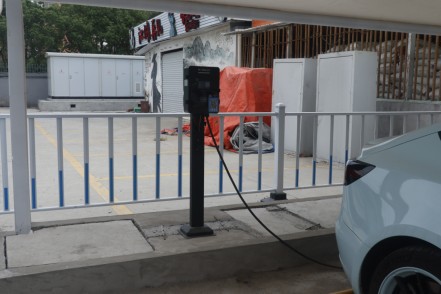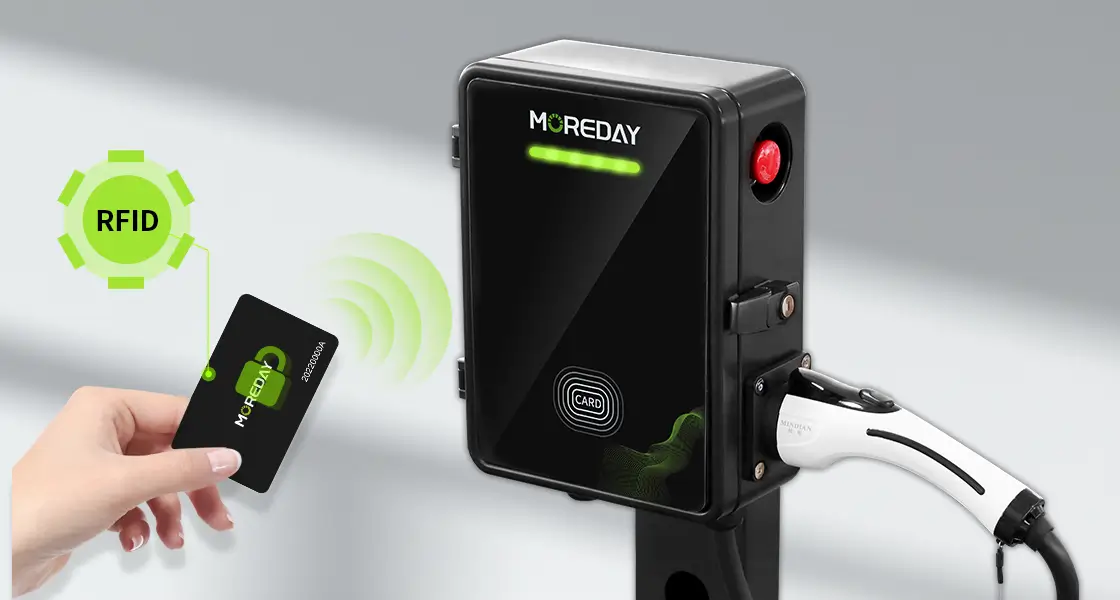Yes, EV home charging stations are generally safe if properly installed and maintained. They are designed with multiple safety features, such as ground fault protection and automatic shutoff, to prevent electrical hazards. However, be sure to hire a certified electrician for installation and follow the manufacturer’s guidelines to ensure optimal safety.
Next, let’s take a comprehensive look at the relevant knowledge about home electric vehicle charging stations to help us better understand the safety issues of EV home charging stations.
What is a home EV charging station?

A home EV charging station, often referred to as a “charging post” or “charger”, is a device designed for the home environment to charge an electric vehicle battery. Its main function is to convert household electricity into the power needed by the EV battery. There are typically two types of home charging stations: Level 1 and Level 2.
- Level 1 charging stations provide charging using a standard 120-volt household electrical outlet. It has the advantage of requiring no additional installation, but is slower to charge, usually taking 8 to 12 hours to fully charge.
- Level 2 charging stations require a 240-volt power source and charge much faster, typically taking 4 to 8 hours to fully charge. Level 2 charging stations typically require specialized installation because they involve more complex electrical wiring.
Installation of home charging stations
Home charging station installations need to meet certain electrical requirements, including specific voltage and current load capacities. After choosing the right type of charging station, it is important to ensure that the home electrical system is capable of handling the loads required by the charging station.
Especially when installing a Level 2 charging station, it is often recommended that the installation be performed by a professional electrician to ensure that all electrical wiring complies with local electrical codes and safety standards.
Security factors for home charging stations
There are various security factors for home charging stations, which you can also consider when purchasing or choosing a charger.
1. Security of charging station hardware
High-quality home EV charging stations usually have multiple security measures in place. For example, many charging devices are UL-certified or other similar safety certifications, which means they meet certain safety and quality standards.
In addition, these charging devices usually have multiple safety features built in, such as mechanisms to prevent overheating, overloading, and short-circuiting, to ensure the safety of the charging process.
2. Electrical system compatibility
Assessing the compatibility of your home electrical system is essential before installing a home charging station. If the home electrical system is unable to handle the extra load required by the charging station, it may lead to electrical failure or fire.
Therefore, it is recommended that EV owners hire a professional electrician to assess and, if necessary, upgrade their home electrical system before installing a charging station to ensure that it can safely and stably support the use of the charging station.
3. Safety of the charging environment
The choice of charging the environment is also one of the key factors affecting the safety of a home charging station. Ideally, charging stations should be installed in well-ventilated garages or outdoors to avoid the risk of overheating or battery leakage due to poor ventilation.
Fire and waterproofing measures should also be in place to deal with the possibility of extreme weather and accidents.
Potential risks and solutions for home charging stations
1. Overheating and fire risk
During the charging process, both the EV battery and the charging equipment may overheat, especially in high-temperature environments or under prolonged use. Overheating may cause a fire risk.
Therefore, choosing charging equipment with overheating protection and keeping the environment ventilated and cool during the charging process are effective ways to prevent overheating. In addition, avoiding prolonged charging in hot weather can also help reduce the risk of overheating.
2. Electric shock and electrical safety issues
Electric shock is another safety issue that requires special attention when using a home charging station. If the charging equipment or cables are damaged, or if they are not handled properly while charging, electric shocks can occur.
To prevent electric shock accidents, EV owners should regularly check the integrity of the charging equipment and cables to ensure that they are not worn or damaged. In addition, users should follow the correct operating procedures when plugging and unplugging the charger and avoid operating it with the power on.
3. Aging and damage to equipment
Over time, the cables, plugs, and other hardware of a home charging station may become worn and aged. This wear and tear can lead to electrical malfunctions and even fire risks.
Regular inspection and replacement of aging equipment can prevent potential risks. It is recommended that EV owners have their equipment inspected at least 1-2 times a year and replaced or upgraded if necessary.
How to ensure the safety of your home charging station

1. Choose certified equipment and professional installation services
Ensuring the safety of your home charging station starts with choosing certified, high-quality equipment, such as a UL-certified charging station. In addition, EV owners are advised to choose an experienced and licensed electrician for installation to ensure that all electrical wiring meets safety standards.
2. Regular maintenance and monitoring
Regular maintenance and monitoring are key to ensuring the safe operation of the charging station. EV owners should regularly check the status of the charging equipment to ensure there is no wear or damage.
In addition, using an intelligent monitoring system to track the status of the charging station in real-time can also help to identify and solve potential problems promptly.
3. User education and safety awareness
Proper use and maintenance behavior of EV owners is also key to ensuring the safety of charging stations. Users should learn and follow charging equipment usage guidelines on how to properly plug and unplug chargers, how to maintain equipment, and how to respond to emergencies.
Increasing user awareness and responsiveness to potential risks and emergencies can effectively reduce accidents.
Future trends in home charging station safety
As technology continues to advance, future home EV charging stations will be equipped with more safety features. For example, some new charging stations are equipped with intelligent features that can monitor the charging process in real time, detect overload conditions, and automatically disconnect the power.
Additionally, the emergence of wireless charging technology, which reduces cable connections and further minimizes the risk of electrical accidents, offers new options for EV charging.
The government and industry are actively working on stricter standards and regulations to improve the safety of home EV charging stations. In the future, more policies may be introduced to require all newly installed charging stations to meet higher safety standards.
Conclusion
The safety of home EV charging stations is a multifaceted issue that includes several factors, including equipment quality, electrical system compatibility, and charging environment. By choosing high-quality charging equipment, ensuring professional installation and regular maintenance, and raising users’ safety awareness, EV owners can effectively reduce potential risks and ensure the safe use of home charging stations.
As technology develops and industry standards improve, the safety of home EV charging stations will be further enhanced to provide users with a safer and more reliable charging experience.
If you’re looking for a high-quality home charging station, contact the sales staff at MOREDAY online, where they offer a wide range of charging posts, from home to utility charging posts as well as solar accessories and other electrical equipment. Come contact us for an accurate quote!
Related reading: Should I Charge My EV Every Night?


